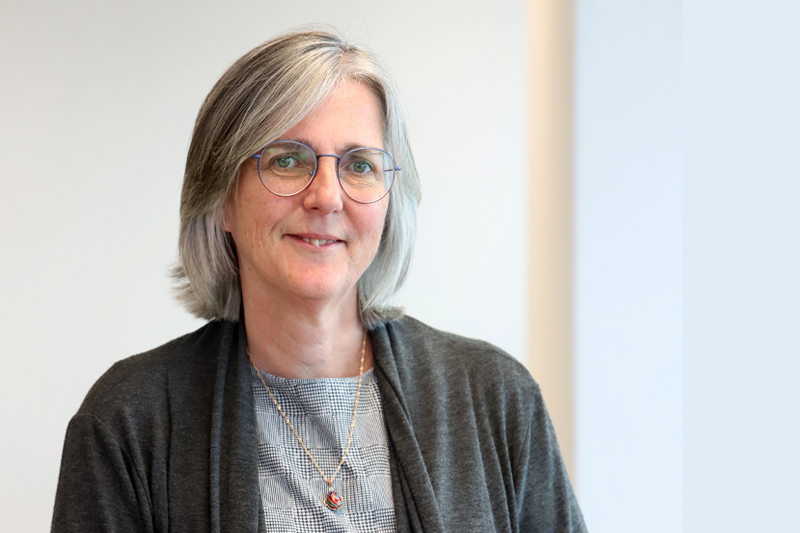UCT’s Institute of Infectious Disease and Molecular Medicine – celebrating change
23 November 2023 | Professor Sue Harrison
Dear members of UCT’s research community
The University of Cape Town’s (UCT) research portfolio increasingly delivers cutting edge research, working across disciplinary boundaries to both create first-in-world new knowledge relevant to our context and to deliver societal impact, as well as improving the quality of life of our people in Cape Town, South Africa and Africa.
By its nature, this type of research crosses faculties, disciplines and applications – as is evidenced across a variety of UCT’s flagship institutes, centres and units such as the African Centre for Cities (ACC), African Climate Development Initiative (ACDI), SA Labour Development Unit (SALDRU), Humanities for Africa (HUMA), Future Water, the Neurosciences Institute (NI) and the Cape Heart Institute (CHI), to name a few. Many of these have soft-funded researchers at their centre.
An outstanding example is UCT’s Institute of Infectious Disease and Molecular Medicine (IDM), launched in 2005 by Professor Wieland Gevers as a new collaborative model for research. The IDM now accounts for some one third of UCT’s research income and an impressive component of UCT’s research output.
It is the critical mass of the IDM and its component units and centres, alongside exceptional scientists drawn from across the Health Sciences, Science, and Engineering & the Built Environment faculties that drives these contributions. For example, in a research highlight, IDM fellow Dr Munyaradzi Musvosvi and full member Professor Tom Scriba from the South African TB Vaccine Initiative (SATVI) published a landmark study in Nature Medicine with colleagues from Stanford University in which they used cutting edge-technology to identify new targets for novel TB vaccine candidates. Illustrating the IDM’s focus on translational research, the Genital Inflammation Test (GIFT) developed by IDM members, Professor Jo-Ann Passmore and Dr Lindi Masson, together with their dynamic team, reached a major milestone by entering into field testing to evaluate its potential as a low-cost rapid test to detect vaginal inflammation, a major driver of HIV risk in young women.
Since its launch in the IDM a year ago, the Africa Microscopy Initiative (AMI) has acted on its mandate for broader imaging training. AMI hosted the second Imaging Africa workshop in October 2022, providing advanced and hands-on imaging training to 24 early-career scientists from across Africa in the AMI Imaging Centre. In partnership with Global BioImaging, South Africa BioImaging, and the African BioImaging Consortium, AMI then hosted a cohort of 30 international participants and faculty at the IDM for an Imaging Facility Management Training workshop in October 2023. As an innovative new model for research capacity strengthening in Africa, AMI was described in a paper published recently in Nature Cell Biology.
As 2023 draws to a close, the leadership of the IDM is set to change. Professor Valerie Mizrahi FRS will be stepping down as director as she retires from UCT. As a university community, it is fitting to pay tribute to the tireless and exceptional leadership she has demonstrated since taking up the role in 2011 and the much-appreciated mentorship she has given to so many researchers.
Filling her shoes is a big task and we are pleased to share with the UCT community that Professor Digby Warner will take on this challenge, serving as the IDM director from the start of 2024. Professor Warner is well known to the UCT community and has made his mark in many ways, including his world leading research on tuberculosis and mycobacteriology, his skilful negotiations in bringing the Africa Microscopy Initiative to UCT as an iconic approach to shared infrastructure on our continent, and the outreach programme, Eh!woza, which he established with his former PhD student, Anastasia Koch.
Research groupings such as the IDM, those mentioned above and the others that make up our 87 accredited research groupings are critical to UCT’s research portfolio and its reputation. They are key sources of new knowledge of global reach, agents of societal change and underpin the focus of UCT as a university in Africa, for Africa. I would like to express appreciation for all UCT researchers who contribute with passion and energy to achieving this.
With kind regards
Professor Sue Harrison
Deputy Vice-Chancellor: Research and Internationalisation
Read previous communications:
 This work is licensed under a Creative Commons Attribution-NoDerivatives 4.0 International License.
This work is licensed under a Creative Commons Attribution-NoDerivatives 4.0 International License.
Please view the republishing articles page for more information.







